
newspaper
news
Eighteen awards were made to 15 buildings nationally in the country’s premier competition for design and architecture
Landmark new offices, a minimalist cave and the famous Yellow Treehouse Restaurant are among outstanding designs recognised in the 2010 New Zealand Architecture Awards. Eighteen awards were made to 15 buildings nationally in the country’s premier competition for design and architecture. A maximum of three New Zealand Architecture Awards can be made in each of 10 categories. The winning projects will now be considered for the 2010 New Zealand Architecture Medal, to be announced in May. Only one Medal may be awarded each year. Wellington-based architect Gerald Parsonson, convenor of the awards jury, said the quality of winning entries had been very high. “The commercial winners were particularly strong architecturally while also displaying a genuine ecological sensitivity,” he said. “We thought the residential projects pushed the boundaries more this year, showing a real inventiveness and uniqueness, from the Mediterranean feel of a clifftop villa overlooking the Sumner inlet in Christchurch to a beautifully orchestrated stone-clad courtyard house in Wanaka.” NZI Centre and Ironbank take five awards Auckland designs took half of all the honours, with nine awards made to projects sited in or near to the city. Jasmax Ltd captured four awards with its NZI Centre at Auckland Viaduct a winner in the Commercial, Sustainable and Interior Architecture categories, and the Hillcrest Road Bridge on the Northern Toll Road near Orewa among winners in Urban Design. RTA Studio was a winner in the Commercial and Sustainable categories for its high-profile Ironbank Centre, also in Auckland, and Athfield Architects took two residential awards for the Clements House in Christchurch and the Fox-Hansen House in Nelson. Jurors agreed the NZI Centre had set new standards for office space and expectations of corporate citizens, praising its elegance, quality and stimulating interior and sustainability principles that are intrinsic to the building’s design. Hillcrest Road Bridge, affectionately dubbed the Pukeko Bridge, was described as a signature structure - “lyrical, elegant and memorable”. Ironbank was judged to have “broken the mould” with judges admiring its cluster of five towers of stacked boxes which provide a dramatic, sculptural form, and the way in which the project was driven by ecological sensitivity. Residential winners The Clements House, which has been hailed as a distillation of the architectural ideas Ian Athfield has experimented with in his landmark home in Wellington, won accolades for its “clever plays between vernacular and sophistication”. The “idiosyncratic” Fox-Hansen House was found to achieve “a striking balance between playfulness, formality and surprise”. Wanaka Lodge, by Patterson Associates, was seen as a confident and striking fresh interpretation of the “European-influenced South Island stone house”. Small Project Architecture The “evocative and imaginative” Yellow Treehouse Restaurant by Pacific Environments Architects NZ, was a winner in Small Project Architecture. Built 10m up a towering redwood tree in Pohuehue, north of Auckland, it was originally built for a Yellow Pages TV commercial. Wiroa Station Wine Cellar, designed by Modern Architecture Partners for the Bay of islands Wiroa Station sub-division development and environmental project, was also a winner in the Small Project Architecture category. The communal wine cellar and meeting place was described by judges as a minimalist cave exuding elegance and restraint. The O’Sullivan Home on Mangere Mountain, at the mouth of Manukau Harbour, by Bull/O’Sullivan Architecture, was summed up as a “compact gem”, inventive, playful and with a sense of theatre. Public Architecture The Mana Tamariki Maori school in Palmerston North, by Tennent+Brown Architects, was among winners in the public architecture category with jurors noting how the architects had carefully listened to the client and Maori sensibilities had driven the project concept. Two Christchurch buildings featured among public architecture winners. The Landscape Architecture Building at Lincoln University, by Sheppard & Rout Architects in association with Royal Associates, captured jurors’ attention with its organic quality and was hailed as proof that “a miraculous outcome can be delivered on a tight budget”. The University of Canterbury’s NZi3 Innovation Institute by Warren and Mahoney, was seen as a celebration of light and transparency providing “a striking new face for the university”. Interior Architecture An interior architecture award also went to a private office in Auckland’s Victoria Precinct, by Fearon Hay Architects. Described as elegant, serene and astute, the predominantly single space can be subdivided using a series of attractive pivoting panels. Urban Design The Beaumont Quarter project in Auckland won an urban design award for Studio Pacific Architecture and was praised as “a great result from a developer-driven project”. The “sculptural” Liardet Street Overpass in New Plymouth, by Boon Goldsmith Bhaskar Brebner Team Architecture, was considered a “fine example of what is possible when a local council decides to go down a design-driven route”.
Jury
Mr Parsonson was joined on the jury by fellow New Zealand architects Nicholas Stevens and Mario Madayag, both from Auckland, and Crispin Schurr from Christchurch. The international juror was Melbourne architect Peter Elliot. Judges evaluated entries against criteria including the relationship of a building to its site and context, design quality, building form, structure and spatial qualities. User satisfaction and environmental aspects were also taken into account. The main consideration for the judges in assessing projects is how well a project resolves key design issues and then builds on this solution to “contribute to the advancement of architecture”. The New Zealand Architecture Awards were established to celebrate the innovation, creativity and excellence of projects nationwide.
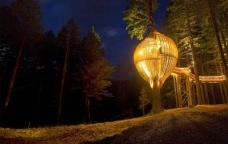
Small Project Architecture: The Yellow Treehouse Restaurant
Pacific Environments Architects NZ Ltd
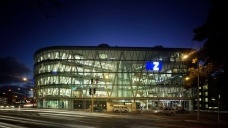
Commercial Architecture: NZI Centre
Jasmax Limited
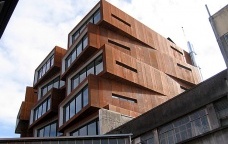
Commercial Architecture: Ironbank
RTA Studio
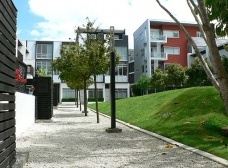
Urban Design: Beaumont Quarter
Studio Pacific Architecture
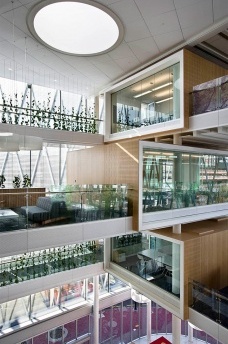
Interior Architecture: NZI Centre
Jasmax Limited

